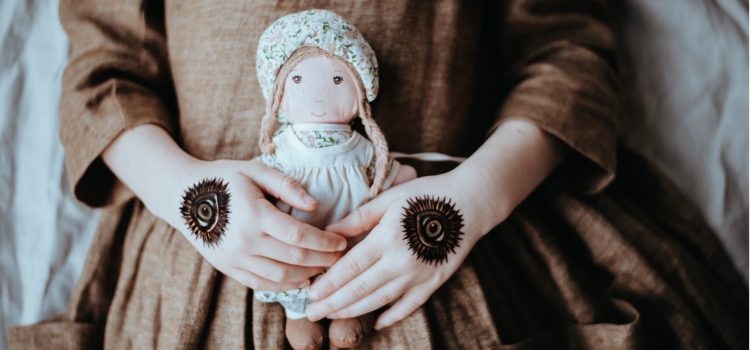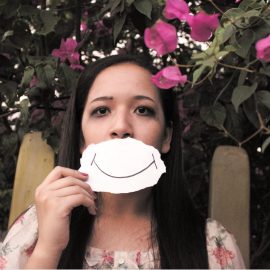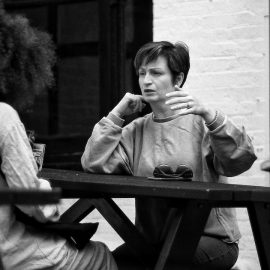

This article gives you a glimpse of what you can learn with Shortform. Shortform has the world’s best guides to 1000+ nonfiction books, plus other resources to help you accelerate your learning.
Want to learn faster and get smarter? Sign up for a free trial here .
Does everyone have trauma from childhood? What are the lasting effects of childhood trauma in adults?
Unless we’ve suffered abuse or extreme neglect in our early lives, we may think that we don’t have any psychological trauma. However, nearly all of us have suffered some form of trauma in our childhoods, and the effects reverberate throughout our entire lives.
Keep reading to learn about the effects of childhood trauma in adults and how you can begin the healing process with compassion for yourself and others.
How Childhood Trauma Affects Development
Many people are survivors of traumatic childhoods, having suffered abuse, physical hardships, or the loss of a parent or sibling. However, the events that warped your childhood need not be dramatic or overt in order to have lasting effects. All childhoods are imperfect, because parents are human, with unmet needs and flaws of their own. Usually, when a parent says or does something that inadvertently hurts their child, the emotional wound will heal over time; but if the hurting is repeated and persistent, it leaves lasting damage that is carried into adulthood.
Childhood trauma has especially severe and long-lasting effects. This is because so much of our brain development happens during the first few years of life. As a result, our childhood experiences are foundational to our worldview, personality, and behavior.
When you’re born, your brain isn’t fully developed. As you grow up, it grows with you. It rapidly forms new synapses—connections between brain cells, or neurons. These synapses make up complex chains, called neural networks, that send information to each other through electrical signals. As this happens, you begin to use new areas of the brain that control language, rational thought, and motor skills.
However, when a child experiences trauma, it can disrupt the brain’s normal development. Think of the adult brain as a city—a complex system of interwoven parts. The early years of childhood development are like the ground that the city is built on. If it is sturdy ground, the city will be structurally sound. But if it is unstable or swampy, the city will develop problems: Its buildings and roads might begin to collapse. If it experiences a severe event like an earthquake, it’ll be more susceptible to damage. Similarly, if a child experiences trauma, the brain’s foundation will be weaker. As the child grows up and the brain grows in complexity, this weak foundation can cause problems.
The Long-Term Effects of Childhood Trauma
For children who suffer abuse, trauma’s impact creates long-term issues. There are three broad ways that childhood trauma can impact people in the long-term: 1) mental and physical health issues, 2) flashbacks and triggers, and 3) unrecognized behavioral patterns. Let’s take a look at each of these.
1) Mental and Physical Health Issues
Suffering a traumatic event in childhood increases the risk of a range of mental and physical health issues later in life. People who experienced trauma as children often experience depression and anxiety, as well as physical symptoms such as chronic pain and increased risk of heart disease.
Doctors sometimes dismiss the physical manifestations of trauma. These doctors might tell patients that the pain is imagined or “psychological,” implying that it isn’t actually happening in the body. However, the mind and body are connected. Physical pain from trauma is real, and addressing that pain is an important part of healing.
2) Flashbacks and Triggers
Another common long-term effect of childhood trauma in adults is flashbacks, in which a trauma survivor relives a traumatic moment. Flashbacks occur when the brain creates long-lasting associations between the circumstances surrounding a traumatic event and the stress response. For example, if a drunk father hits his child, the child’s brain may create an association between the smell of alcohol and a state of fear. The brain learns that when that smell is present, bad things happen.
Our brains create these associations to protect us from similar situations in the future. For example, the next time the child smells alcohol, his brain will recognize the situation and tell him to hide or run away. However, the brain can sometimes do its job too well, triggering our stress response even if we aren’t in danger.
For example, when the child grows up, he might suddenly experience a stress response when a middle-aged man smelling of alcohol approaches him. Even if he isn’t in any immediate danger, he might feel suddenly anxious and uneasy.
3) Unrecognized Behavioral Patterns
Experiencing love and care as a child allows us to develop healthy relationships later in life. Childhood trauma can create a vicious cycle in which the child doesn’t know how to receive love and becomes more and more isolated.
These behavioral patterns continue to influence us as adults, even though we might not be aware of them. When someone experiences trauma, they come to expect the same patterns of abuse that they suffered as children. This can inhibit our ability to form healthy relationships, especially if we’re unaware of how our childhood trauma is influencing us.
For example, if a person is abandoned by her parents when she’s young, she might later struggle to develop trust in intimate relationships. Because of her childhood trauma, she might mistakenly come to expect that anyone who says they love her will leave. However, if she isn’t aware of her childhood trauma or the effect that it has on her, she might think her feelings are based in reality. This could make it difficult for her to form a trusting relationship.
TITLE: What Happened to You?
AUTHOR: Bruce Perry and Oprah Winfrey
TIME: 17
READS: 33.5
IMG_URL: https://www.shortform.com/blog/wp-content/uploads/2022/07/what-happened-to-you-cover.png
BOOK_SUMMARYURL: what-happened-to-you-summary-bruce-perry-and-oprah-winfrey
AMZN_ID: XYZ
How Childhood Trauma Affects Romantic Relationships
Your childhood trauma plays a key role in the way you select romantic partners. For example, a person whose father prioritized work over family may be drawn to someone who’s career-driven, with the unspoken agenda of getting their partner to make them their life’s focus, and not their job instead. In other words, your subconscious wants to recreate your childhood, with the intention that “this time, you’re going to get it right.”
During childhood, your subconscious creates a blended image of all the people responsible for your care—parents, grandparents, foster parents, older siblings, and so on. This imaginary gestalt is called “the Imago.” Your own Imago is an idealized image that closely resembles the people who raised you, with all their positive and negative traits, while also making up for your repressed desires and feelings.
Consider the example of a woman we’ll call “Patty.” She was raised by thoughtful, intelligent parents who nevertheless fell short in some ways of nurturing her fully as a child. Patty’s father was an investment adviser who worked long hours and was rarely at home. He encouraged Patty to excel in school, but couldn’t acknowledge her feelings. In fact, he would get angry if she was openly sad or anxious at home.
Patty’s mother was more available, a painter who worked from a studio in their house. Since she spent most days alone, she relied on Patty to provide much of the emotional support she didn’t receive from Patty’s father. As such, she monopolized Patty’s time whenever she could, micromanaging her daughter as if she was an extension of herself.
As a result, Patty’s “idealized parental image” is of a person who is intelligent, hard-working, and creative, while also being controlling, dismissive, and in need of their own emotional care.
Whether we know it or not, this parental image is the template we use when evaluating potential romantic partners—and the more closely a potential mate matches your unconscious parental image, the more you feel attracted to them. While we may think we know why we find certain people attractive, this process is entirely unconscious and can take place very quickly.
TITLE: Getting the Love You Want
AUTHOR: Harville Hendrix and Helen LaKelly Hunt
TIME: 17
READS: 20.8
IMG_URL: https://www.shortform.com/blog/wp-content/uploads/2022/07/getting-the-love-you-want-cover.png
BOOK_SUMMARYURL: getting-the-love-you-want-summary-harville-hendrix-and-helen-lakelly-hunt
AMZN_ID: XYZ
Healing From Childhood Trauma
No matter what traumas lie in your past, you can break the pattern of suffering. To achieve true, sustained healing, you must develop practices tailored to your unique circumstances that bring forward soothing emotions and physical sensations. The practices you choose should move you at a deep emotional level—powerful enough to eclipse the old, restrictive emotions and patterns that have been interfering with your freedom.
Family trauma expert Mark Wolynn suggests several practices that can help heal childhood trauma in adults:
Visualizations
Mental images are a powerful healing tool. Wolynn suggest the following visualization practice for healing childhood trauma in adults:
- Place your hand on the area of your body that’s been in discomfort—maybe your chest, stomach, or head—and visualize warm, calming light flowing into that area. You can add an affirmation to deepen this experience: “In this moment I am safe.”
- Every time you look at a photo of the family member who experienced the original trauma, imagine sending them a wave of love.
- Imagine showering yourself or your family member with loving energy each time you brush your teeth or brew your coffee.
Mend Broken Relationships
Wolynn recommends that you use insights about past grievances to mend broken relationships. You can do this even if your family members are deceased or if you don’t know where they are. Here are some options to do this:
- Have a conversation—either in your head or out loud—with your family member addressing their particular trauma: “I know you went through great pain when your husband died suddenly of a heart attack. I have been holding that pain, which has caused me to be needy and clingy in my relationship with my husband. I am surrendering this pain back to you now. Whenever I feel insecure in my relationship, I will breathe in your love and support.”
- Express gratitude toward a parent at a level that feels authentic to you, either privately or in conversation with them—whatever you can muster. For example, you could say, “I am grateful to you for giving me life,” or “I have rejected you and blamed you for a long time. Now I am choosing to be at peace.”
- Imagine your parent saying something loving to you: “I did things to hurt you and I am sorry. Please accept the love I have for you.”
Wolynn clarifies that healing these relationships doesn’t mean excusing a parent’s behavior or even necessarily resuming any kind of ongoing connection with a parent. Rather, he says, healing requires dropping the anger-filled, accusatory stories we have about our parents. Releasing those stories isn’t about giving up or giving in for the benefit of our parents. It’s about freeing ourselves so we can move forward.
| Conflicting Views on Reconciling With Parents Some psychologists say that children of parents who inflicted trauma and abuse should not initiate efforts to repair those relationships—that any healing needs to start with those who caused the suffering. Their view is that children who take it upon themselves to repair these broken relationships put themselves in the position of being the parent, which is likely the unhealthy dynamic they were forced into when they were growing up. Consequently, reengaging with the parent now can expose them to further trauma and abuse. Still others assert that forgiving abusive parents can do more harm than good, and cutting ties is the better option. From this viewpoint, forgiveness is a two-way street and requires a heartfelt acknowledgment by the abusive parent that they have done something horrible. If a parent isn’t willing or able to acknowledge their harmful behavior and its impact, the child will be exposed to even deeper trauma. |
Other Healing Techniques
Wolynn also offers many creative suggestions to nurture the healing process for childhood trauma in adults. Here are a couple of ideas to spark your imagination:
- Plant a tree to represent new life and freedom. Each time you tend it, express gratitude for your family’s support and sacrifices.
- Volunteer at a charity devoted to an issue related to your trauma, such as a shelter for abused women or preventing homelessness. Each time you volunteer, send a message to your family member who suffered the original trauma: “I’m sorry you suffered for so long in an abusive relationship. I am doing something good with that pain now to make a difference for others.”
TITLE: It Didn't Start With You
AUTHOR: Mark Wolynn
TIME: 17
READS: 51.3
IMG_URL: https://www.shortform.com/blog/wp-content/uploads/2022/06/it-didn-t-start-with-you-cover.png
BOOK_SUMMARYURL: it-didnt-start-with-you-summary-mark-wolynn
AMZN_ID: XYZ
Final Words
Childhood trauma can influence behavior in subtle yet pervasive ways. Trauma survivors often develop negative habits and ways of seeing the world, sometimes without realizing it. Healing childhood trauma in adults is a lifelong journey, but some deep traumas may never heal fully.
If you enjoyed our article about childhood trauma in adults, check out the following suggestions for further reading:
TITLE: The Body Keeps the Score
AUTHOR: Bessel van der Kolk
TIME: 40
READS: 20.7
IMG_URL: https://www.shortform.com/blog/wp-content/uploads/2020/01/body-keeps-score-cover.jpg
BOOK_SUMMARYURL: the-body-keeps-the-score-summary-bessel-van-der-kolk
AMZN_ID: B00G3L1C2K
TITLE: Lost Connections
AUTHOR: Johann Hari
TIME: 45
READS: 66.4
IMG_URL: https://www.shortform.com/blog/wp-content/uploads/2021/05/lost-connections-cover.png
BOOK_SUMMARYURL: lost-connections-summary-johann-hari
AMZN_ID: XYZ

Want to fast-track your learning? With Shortform, you’ll gain insights you won't find anywhere else .
Here's what you’ll get when you sign up for Shortform :
- Complicated ideas explained in simple and concise ways
- Smart analysis that connects what you’re reading to other key concepts
- Writing with zero fluff because we know how important your time is






